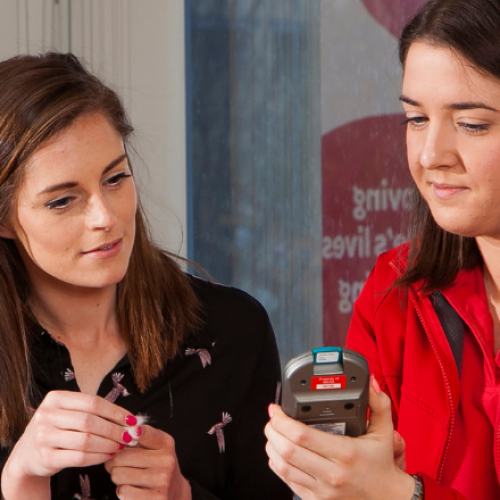Cholesterol is a natural fatty substance found in your blood and it is essential for healthy functioning of the body. Cholesterol is made in the liver, but we also get cholesterol from the food we eat, in particular from high fat foods.
Cholesterol is carried in your blood by proteins and are known as lipoproteins when they combine together. There are two main types of cholesterol or lipoproteins.
- ‘Good’ cholesterol or High Density Lipoproteins (HDL) that takes fat away from your artery walls
- ‘Bad’ cholesterol or Low Density Lipoproteins (LDL) that sticks to your artery walls and causes a fatty build up.
There is another type of fat called Triglycerides. This is a fatty substance found in our blood and its presence is linked to unhealthy lifestyles such as drinking too much alcohol or eating high fat and sugary food. Triglycerides can lead to the narrowing of the artery walls, increasing your risk of heart disease or stroke.
You can have a normal level of HDL and non-HDL cholesterol but still, have a high triglyceride level.
High cholesterol can increase your risk of developing heart disease, such as having a heart attack or stroke.
-
Cholesterol is a natural fatty substance found in your blood which is essential for the body to function. However, too much of it can cause fatty deposits to build up in the arteries, increasing your risk of heart and stroke illnesses.
Made in the liver, cholesterol can also be sourced from the food we eat from high-fat foods. It’s carried in the blood by proteins and when these combine, they’re referred to as lipoproteins.
There are two main types of cholesterol or lipoproteins:
- ‘Good’ cholesterol or High-Density Lipoproteins (HDL): Take fat away from your artery walls
- ‘Bad’ cholesterol or Low-Density Lipoproteins (LDL): Stick to your artery walls and causes a fatty build-up.
Another type of fat found in our blood is Triglyceride, which is linked to unhealthy lifestyles such as drinking too much alcohol or eating high-fat and sugary food. Triglycerides can cause narrowing of the artery walls, increasing your risk of heart disease or stroke.
You can have a normal level of HDL and non-HDL cholesterol but still have a high triglyceride level.
-
Our cholesterol check is done by pricking your finger, similar to the NHS Health Check. A drop of blood is put on a strip of paper. This is put into a machine that checks your cholesterol in minutes.
Our Cholesterol checks follows NICE (National Institute for Health & Care Excellence) guidelines.
-
Total cholesterol:
Less than 5.0mmol/L.
HDL
Above 1.0 mmol/L for males and above 1.2mmol/L for females.
LDL
Should be below 3.0 mmol/L.
Triglycerides (non-fasting)
Should be below 2.3 mmol/L.
Triglycerides (fasting 10-14 hours)
Should be below 1.7 mmol/L.
Total cholesterol/HDL ratio
Should be below 6
-
High cholesterol is often related to unhealthy lifestyle habits, such a diet high in saturated fat, not getting enough exercise, being overweight or having too much body fat and smoking. Making changes to your lifestyle will help reduce your cholesterol. It’s also important to take any medication prescribed by your doctor.
High cholesterol does not have any symptoms, so you can only find out if you have it from a blood test. It can sometimes be inherited from our families and can increase with age. Familial Hypercholesterolaemia (FH) is a type of high cholesterol you are born with. There’s no cure for FH, but treatment can reduce the risks of developing heart disease and early detection is vital.
-
It’s recommended that you get your cholesterol checked regularly, particularly if you are over 40 or if you are exposed to other risk factors in your diet, lifestyle or family history. There are no physical signs and symptoms of high cholesterol. If you already have high cholesterol or a medical condition that increases cardiovascular risk, you should take advice from your GP on how often to get checked.
-
Lifestyle changes can help prevent and significantly reduce cholesterol.
You can help to reduce your cholesterol by:
- Eating a healthy balanced diet that is low in fat and high in fruit, vegetables and healthy carbohydrates
- Managing your weight in line with recommended levels.
- Increasing your physical activity and exercise.
- Limiting your alcohol to recommended levels.
- Quitting smoking if you smoke.
Find out more about lifestyle changes you can make to keep healthy:
Our Well Checks include a cholesterol check as well as a lifestyle assessment and give you the opportunity to speak to one of our qualified health promotion officers about any concerns you have around your health, and receive personalised tips and advice.
Find out moreDownload our Cholesterol Factsheet:
-
Cholesterol FactsheetDownload pdf

